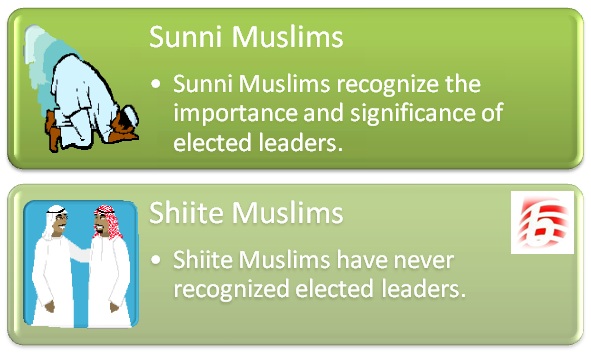Since Sunni and Shiite are two terms that are much used in the Muslim world, but outsiders do not realize the differences in these two denominations, it is very useful to know the difference between Sunni Muslims and Shiite Muslims. The Oxford dictionary defines a Muslim as a follower of the religion of Islam. As for Islam, it is one of the major religions of the world that was delivered to the world by Muhammad as the Prophet of Allah. Although both Sunni and Shiite Muslims accept almost all the faiths of Islam, they show the difference between them in terms of political explanations. Spiritually they do not differ much but politically they differ a lot. Political differences between the two sub-groups, Sunni Muslims and Shiite Muslims, increased gradually so that they paved the way for spiritual significance too. Till the death of Mohammed the Prophet, both sub-groups did not show much of a difference between them, but after the death of Prophet Mohammed, Shiite and Sunni Muslims began to show some difference between them.
Key Takeaways
- Sunni Muslims recognize the importance and significance of elected leaders, while Shiite Muslims have never recognized elected leaders.
- Sunni Muslims have a larger population than Shiite Muslims, constituting 85% of the Islamic community.
- Shiites look upon Imams as God and consider them infallible, whereas Sunni Muslims do not accept this and believe no one can be given saint status in Islam.
More about Sunni Muslims and Shiite Muslims
The word Sunni means one that follows the tradition of the Prophet. Some of the followers felt that the leadership of the Islamic nation should be with one of the family members of the Prophet. Hence, the differences arose between the two sub-groups of Islam.
Shiite Muslims believed that after the death of Prophet Mohammed, the leadership should have gone to his cousin, Ali. Shiite Muslims have never recognized elected leaders. This is the main difference between the Sunni and Shiite Muslims. The Sunni Muslims recognized the importance and the significance of elected leaders. They did not stress upon the idea of the cousin of Prophet Mohammed becoming the leader by choice.
The word Shia means the supportive group. Between both the groups, the Sunni group enjoys a larger population. They constitute 85% of the Islam community. Shia Muslims can be found in places like Iran and Iraq apart from other areas like Lebanon, Bahrain and Syria.
It is very interesting to note that despite major political differences between them, they agree with the tenets of Islam without showing any difference. They accept the Islamic faith in its entirety and enjoy a good relationship with each other.
Shia Muslims look upon Imams as God and consider them as infallible. The Sunni Muslims differ in this regard. They are of the opinion that no one can be given the status of a saint in Islam. Sunni Muslims believe that the leadership of the community is not by birth, but it is conferred upon by people that have the right to take it away any time they want.
What is the difference between Sunni Muslims and Shiite Muslims?
- Sunni Muslims recognize the importance and significance of elected leaders. Shiite Muslims have never recognized elected leaders.
- Sunni Muslims have a larger population than Shiite Muslims. Sunni Muslims constitutes 85% of the Islamic community.
- Shiites look upon Imams as God and consider them infallible. Sunni Muslims do not accept this. They believe no one can be given saint status in Islam.
Further Reading:
Difference Between Shia and Sunni
Related posts:
Difference Between Religion and Spirituality
Difference Between Monism and Dualism
Difference Between Christianity and Judaism
Difference Between Philosophy and Theosophy
